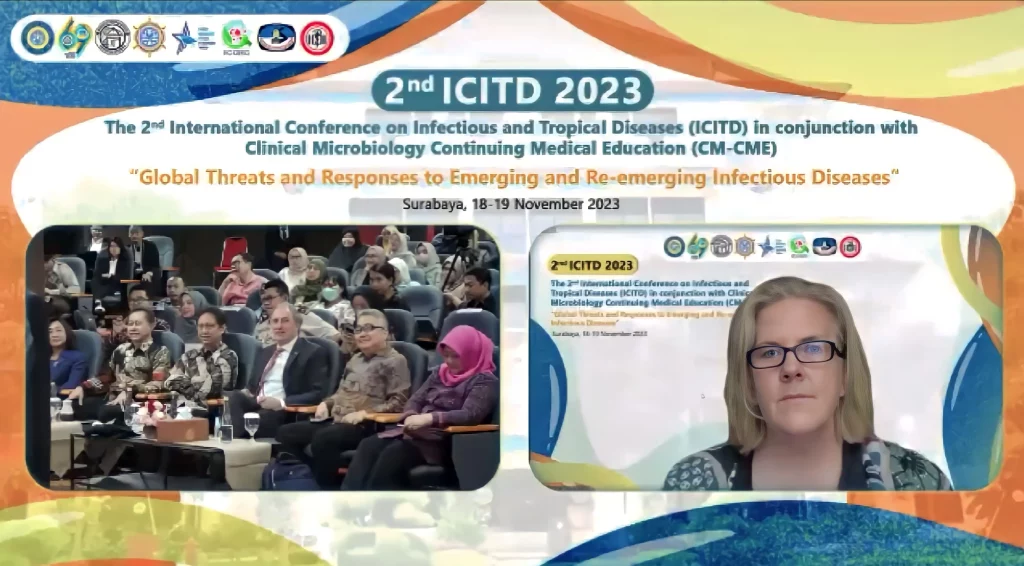UNAIR NEWS – Research Center on Global Emerging and Re-Emerging Infectious Diseases (RC GERID) Universitas Airlangga (UNAIR) has held the 2nd International Conference on Infectious and Tropical Disease (ICITD) In Conjunction With Clinical Microbiology Continuing Medical Education (CM-CME). It was themed “Global Threats and Responses to Emerging and Re-Emerging Infectious Disease” and held at Majapahit, Hall ASEEC Tower, Dharmawangsa-B Campus on Saturday, November 18, 2023, and Sunday, November 18, 2023.
Dr Tamara Curtin Niemi, a World Health Organization (WHO) Representative at this international conference became a keynote speaker on the topic of global threats. Tamara has worked in the field of public health emergencies, crises, and conflicts for more than 20 years in Europe, Africa, the Middle East, and Asia. Starting in May 2022, she leads the emergency program at the WHO Country Office in Indonesia.
Initially, Tamara explained the data and scope of regions affected by infectious diseases that emerged from 2003 to 2022. For example, ebola, Nipah, MERS, bird flu, cholera, and dengue fever made global headlines. Most recently, the world was also attacked by the Covid-19 virus.
Furthermore, Tamara explained, in general, that the rapid evolution of viral and bacterial pathogens caused the spread of infectious diseases. Thus causing the emergence of new strains that are often more virulent or resistant to existing treatments or vaccines. According to her, this rapid evolution can complicate prevention or treatment efforts.
“A disease that originates in one part of the world can quickly become a global pandemic, as demonstrated by COVID-19. And in my personal experience, antimicrobial resistance, misuse of antibiotics and antimicrobial agents has led to the development of drug-resistant strains of pathogens, making it difficult to treat infections effectively and increasing the risk of widespread treatment failure,” she said.
Tamara said that the increasing cases of zoonotic diseases that originate from animals and are transmitted to humans require the involvement of humans and animals, considering zoonotic diseases monitoring and controlling is quite complicated.
Furthermore, the WHO representative assessed that a lack of supervision and preparedness also causes the spread of zoonotic diseases. “Inadequate disease surveillance systems in some areas make early detection of outbreaks difficult. Lack of preparedness, including stockpiling of medical supplies and increasing capacity in the health care system, can hinder an effective response,” she continued.
Moreover, according to Tamara, individual or community refusal to be vaccinated can also hamper efforts to prevent the spread of disease and the re-emergence of public health threats. For her, doubts about vaccines are increasingly becoming a concern in many parts of the world, including Indonesia.
In reconciling this threat, continued Tamara, we can take a health approach by ensuring everyone has access to health services. She also revealed that cooperation is essential regardless of country, class, religion, or race.
“We need to make efforts to ensure that the most vulnerable group to these diseases have access to the care and preventative measures they need so that every country has access to preventive measures such as vaccines,” said Tamara.
Author: Aidatul Fitriyah
Editor: Khefti Al Mawalia









